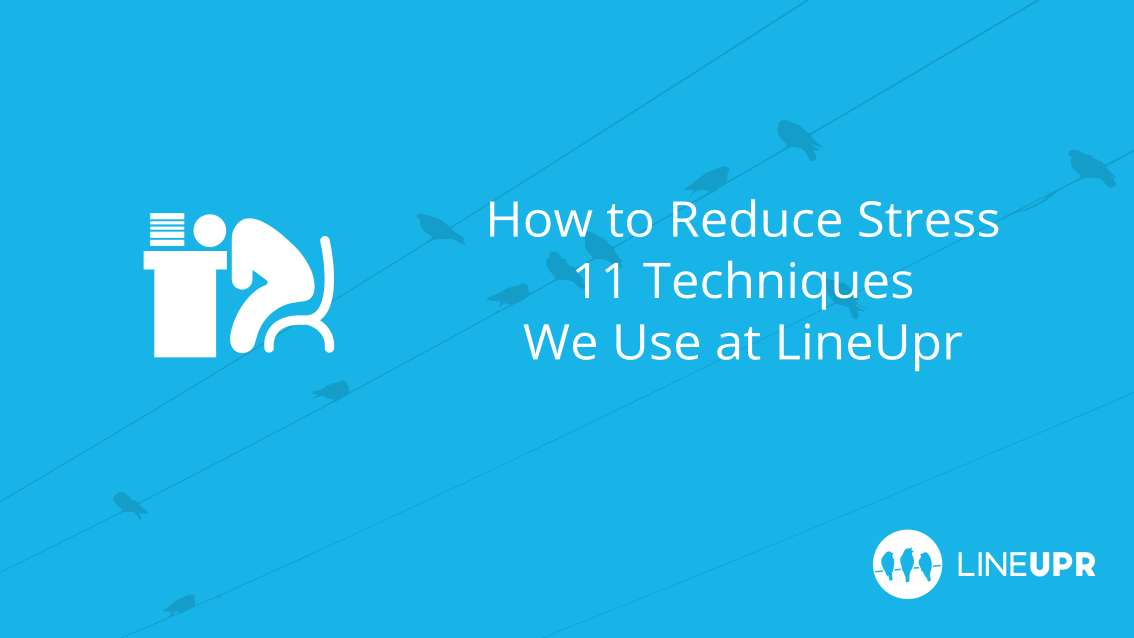Reading time: 4 minutes
Stress arises when unexpected happens. Everyone knows it from his life. We show you 7 strategies to reduce and control such sudden changes. And more, we share our four favorite techniques for dealing with stress at LineUpr.
We experienced it, our customers experienced it, and you too. Everything is perfectly planned but then reality hits you. Sometimes everything crashes and you get overwhelmed by tasks. Through our daily work with event managers we know this very well and have developed our own strategies for dealing with stress. Today, we share 11 of these strategies with you.
Stress. What and How
Sure, as an event planner you have a lot of responsibility. You have to choose locations, allocate budgets, recruit speakers and sponsors, and so on. We could extend this list but I guess you get the point.
What most people don‘t know stress does not usually arise from many tasks, but from unexpected deviations. External, uncontrollable factors often triggered these spontaneous changes. This lack of control is the leading cause of stress. You simply feel helpless.
In the end, you only have two choices. Either you reduce the potential for stress, by better preparation or you use techniques to manage stress more calmly. The former may sound good but is more of an illusion. No one can control everything. It is more promising to plan enough time for counteractions if something goes wrong. However, it is essential to react calmly to the deviations and keep a cool head.
Stress Relief Through Relaxation
Like already mentioned, often external factors play a decisive role in the development of stress. Factors, which you can’t control. Therefore, it is impossible to prevent any pressure. Sometimes, it is much more successful to accept specific events merely. In this case, we have some techniques to relax for you.
As already mentioned, no one can control all circumstances. Deviations and thereby stress are inevitable. So how about a few techniques that will help you to act calmly and initiate successful countermeasures. Here are our tips:
1. A Hot Drink
No, we don’t mean coffee. Caffeine is a bad idea in a stressful situation. Unlike a delicious tea. Practically on all tables at LineUpr are at least one pot of hot tea. Firstly, a warm cup in the hands creates a positive feeling. Secondly, a warm drink calms the throat and soothes the nervous system and thirdly, the delicious smell creates a good mood. So why don’t you just bring your favorite tea to the office tomorrow?
2. Healthy Snacks
Yes, the old tale about healthy eating. The narrative is old, but it’s true. When you are under stress, your body needs energy. Good energy. So not a ton of sugar or mighty servings, but energy that strengthens you and does not burden your head or make it sluggish. For example, a perfect snack is two to three pieces of dark chocolate. Pieces and not bars! The high cocoa content ensures the release of endorphins in your body and thus a feeling of happiness.
3. Joy for the Ears
People need music. Our Stone Age ancestors have already drummed and “produced” their own music to strengthen the group and create inner joy. What worked 1000 years ago is still a great idea today. If it gets too much for you, grab your headphones and listen to your favorite music. Just forget the outer world and relax. The kind of music doesn’t matter. A New Age tip is brainwave music. Maybe that’s something for you, too.
4. A Nice Chat
Humans are gregarious animals. We used to be in company. And when we have problems, we talk to another person. First, to express our concerns and secondly to get feedback. So, if the stress is overwhelming then just go to the common room and talk to a colleague. The conversation alone helps to maintain a new perspective and to relax a bit. In the best case, he even has an advice or the saving idea for you.
Stress Reduction Through Efficient Processes
You can reduce the potential for stress in advance by integrating efficient processes into your workflow. Here are seven strategies that help us at LineUpr in our everyday life:
1. Detailed Concepts
Each project starts with a concept. You should work this out as precisely as possible. In addition to the actual goal of the project and its implementation, you should also identify potential disruptive factors. It is important to think through how these factors work and to sketch out possible counteractions. It’s not about you thinking all day about what can go wrong. It’s just that you’re prepared. You should also integrate enough time for all planning and organizational steps. Ambitious targets are fine, but they lead to a high-stress burden. Better plan realistically and efficiently.
2. Step by Step
Large projects always consist of many small subtasks. Unfortunately, many event managers make the mistake of dealing with all these tasks in parallel. What was useful in the concept phase is very obstructive when executing the plan. If you are always monitoring all the tasks, you quickly get the feeling that you are not going to make progress and that you are choking in work.
It makes more sense to deal only with the next steps and let yourself be reminded of future tasks by a calendar or any other tools. In football, this is described as “The Process” concept. Players should not think about the whole game but always focus on the next snap/play. You should behave similarly when it comes to the execution of your projects.
3. Monitoring
To keep deviations to a minimum, you should check the results of your actions on a regular basis. This is the only way you can counteract quickly and efficiently if something unexpected happens.
4. Breaks
We all know it. When the number of tasks increases, we try to compensate for this with even more work. Due to the additional tasks, most people tend to skip their breaks. This is a mistake. Yes, breaks require some time but they lead to a significant increase in productivity.
So, invest your time and take a break regularly, it’s worth it.
5. Focus on Problem Solving
When problems arise, many people prefer to look for a guilty party instead of a solution. That is a wrong approach. You should always keep an eye on the result and concentrate on solving the problem.
Once this is done, you can still analyze why the problem has occurred and who is responsible for it.
6. Learning from Experience
Each project should end with a review. Was the concept planned sufficiently? How did the external factors behave? If deviations have occurred, why and how can this be prevented next time? You should document your findings and derive recommendations for you and your employees.
Next time, you’ll be even better prepared.
7. Routines
Do you want to know the great thing about routines? You don’t have to make conscious decisions. This relieves you and reduces stress. So, deduce work routines from your experience. The more often you rely on habits, the more efficient you will become. And the beauty of it, your stress level is also dropping. Creating and feeling more relaxed at the same time.
Learnings of the Day
If results deviate from the plan, this will inevitably lead to stress. We have outlined seven strategies to help you avoiding these deviations and reducing their negative impact. Of course, you can never be prepared perfectly and a certain amount of stress is part of your daily work routine, so we have also introduced you to the four techniques we use at LineUpr to keep our stress levels as low as possible.
What techniques do you use to reduce stress? How do you deal with it in everyday life? We look forward to your feedback.
“Stress” Icon created by Hare Krishna from “the Noun Project“.



